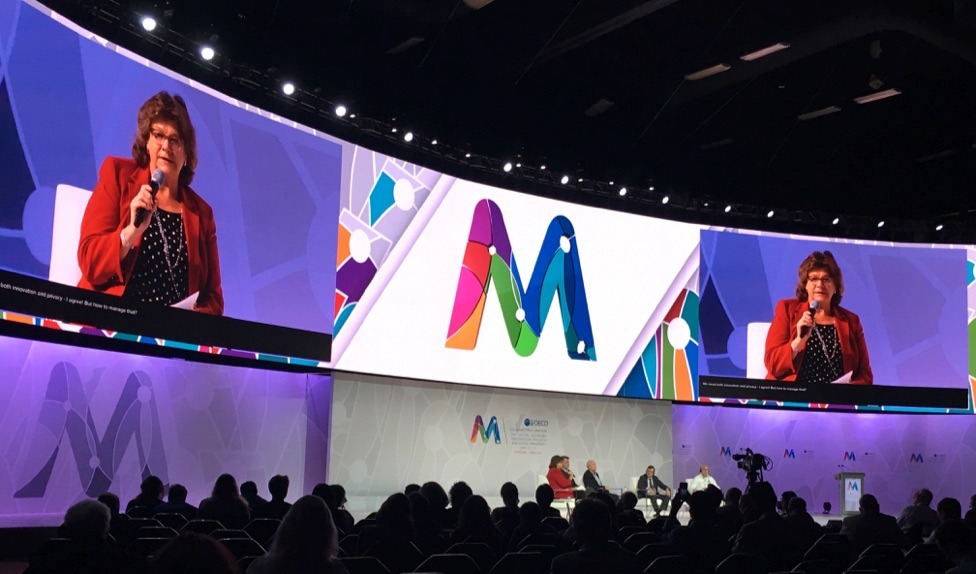On 22 June 2016, Internet Society President & CEO Kathy Brown spoke at the OECD Ministerial on the Digital Economy in the “Armchair Discussion” as a member of the OECD Internet Technical Advisory Committee (ITAC). These are her remarks as prepared.
I am pleased to a speak on behalf of the Internet Technical Advisory Committee this morning.
Our message today is that the aspirations of this OECD Ministerial Meeting – that the Digital Economy will bring Innovation, Growth and Social Prosperity – will not be met without an open, trusted Internet.
We are acutely aware of how the Internet impacts and transforms the world. It has the potential to accelerate human progress, bridge the digital divide and develop knowledge-based societies.
Over the past 20 years, we’ve seen the Internet change how people work, socialise, learn, share, and innovate. We’ve seen its impact on economies, on business, on government.
Today we are at a defining moment. We face a situation where we risk undoing all of the progress we have made over the past three decades.
More explicitly, we face a choice between an Internet that is open and that encourages innovation and one that is more tightly controlled which may have the opposite effect of stifling progress.
We are concerned that the growing anxiety of users around security and privacy issues may encourage governments to close and fragment the Internet for more control. We are worried that this could undermine individuals’ ability to use the Internet to improve their lives and the lives of others.
This makes trust the key issue in defining the future value of the Internet.
Each week we seem to hear of more massive data breaches. A recent survey in the US found that 45% of users had changed their behaviour online because of their fears. These concerns were amplified by the One Internet report released yesterday by the Global Commission on Internet Governance.
This must change.
Trust can only be ensured through collaborative solutions, and by making multistakeholder participation the norm in all aspects of the Internet’s governance.
Governments alone cannot create a more trusted Internet. Businesses alone cannot create a more trusted Internet. The technical community alone cannot create a more trusted Internet.
This collaborative approach to security was a great area of focus at yesterday’s ITAC Forum.
The key point is that a trusted Internet is not achieved by a single treaty or piece of legislation; it is not solved by a single technical fix, nor can it come about because one company, government or individual decides security is important.
At the Internet Society, we are trying to make more explicit the different dimensions of a framework for trust. We have identified four building blocks that we believe are the foundation for a trusted Internet:
· User trust
· Trusted networks
· Trustworthy ecosystem
· Technologies for trust
We are posting a paper today on this framework in which we suggest policy initiatives for each of these elements to build best practices across the Internet. We seek input from the community on the viability of this approach.
The framework seeks to capture the attributes of successful models for addressing the challenges of trust. I was recently in Japan and was intrigued by how the Japanese Internet community has organised itself in preparing for the Internet of Things (IoT). They understand that to be successful with the IoT; they need to do two critical things: deploy IPv6 so there can be enough addresses; and build in security from the start.
How the community is addressing these issues is what, in my view, will ensure its success.
Rather than taking a top-down regulatory approach, they have formed working groups across all stakeholders – government, business, universities, the technical community – to collaborate on addressing areas of concern. This multistakeholder process takes time and requires a commitment to intentional cooperation and win-win outcomes. And, it requires some degree of humility on the part of all to recognise that a joint, cooperative approach is more likely to result in a sustainable plan. I commend the report of their efforts – presented yesterday at the ITAC meeting by our ISOC Trustee Hiroshi Esaki.
We need to build a greater trust in the Internet urgently to open up the growth and prosperity promised by the digital economy. The way to do this is through collaboration. The OECD has led the way on multistakeholder decision-making. We look forward to further work on this issue at this week’s meeting and urge the member states to adopt this forward thinking in building a better future for the Internet.
Thank you.

